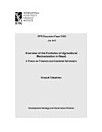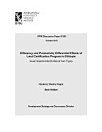Reverse-Share-Tenancy and Marshallian Inefficiency: Landowners Bargaining Power and Sharecroppers Productivity
Hosaena Ghebru Hagos · Stein T. Holden
maj 2013 · IFPRI Discussion Paper 1. knjiga · Intl Food Policy Res Inst
E-knjiga
48
Strani
family_home
Primerno
info
reportOcene in mnenja niso preverjeni. Več o tem
O tej e-knjigi
While there are ample empirical studies that claim the potential disincentive effects of sharecropping arrangements, the existing literature is shallow in explaining why share tenancy contracts are prevalent and diffusing in many developing countries. Using a unique tenant-landlord matched dataset from the Tigray region of Ethiopia, we are able to show how the tenants strategic response to the varying economic and tenure-security status of the landlords can explain sharecroppers productivity differentials. To the best of our knowledge, this is the first study to use tenantlandlord matched data that accounts for both the supply (landlord) and demand (tenant) side characteristics in analyzing sharecroppers level of effort and productivity. The study reveals that sharecroppers yields are significantly lower on plots leased from landlords who are non-kin, who are female, who have lower income-generating opportunity, and who are tenure insecure than on plots leased from landlords with the opposite characteristics. While, on aggregate, the results show no significant efficiency loss on kin-operated sharecropped plots, more decomposed analyses indicate strong evidence of Marshallian inefficiency on kin-operated plots leased from landlords with weaker bargaining power and higher tenure insecurity. This study thus shows how failure to control for the heterogeneity of landowners characteristics can explain the lack of clarity in the existing empirical literature on the extent of moral hazard problems in sharecropping contracts.
Ocenite to e-knjigo
Povejte nam svoje mnenje.
Informacije o branju
Pametni telefoni in tablični računalniki
Namestite aplikacijo Knjige Google Play za Android in iPad/iPhone. Samodejno se sinhronizira z računom in kjer koli omogoča branje s povezavo ali brez nje.
Prenosni in namizni računalniki
Poslušate lahko zvočne knjige, ki ste jih kupili v Googlu Play v brskalniku računalnika.
Bralniki e-knjig in druge naprave
Če želite brati v napravah, ki imajo zaslone z e-črnilom, kot so e-bralniki Kobo, morate prenesti datoteko in jo kopirati v napravo. Podrobna navodila za prenos datotek v podprte bralnike e-knjig najdete v centru za pomoč.








